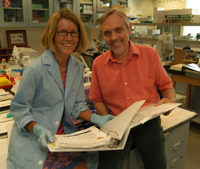|

Researchers are Telling
'Best Fish Story on Campus'
by Dave Reid
from Dateline (June 19, 2003)
 |
| Research associate Anna Gawlicka and
Michael Horn, professor of biological science, review
notes on their extensive basic research into the eating
habits of two species of prickleback fish found in the
intertidal waters of California’s central coast.
Later this month, Gawlicka will deliver the research findings
at an International conference in Brazil. Horn will present
information on a study of Costa Rican freshwater fish
at the same conference. |
|
 |
When certain species of prickleback fish get
hungry, they may either dine on the “catch of the day”
– smaller fish – as carnivores or marine plants, as
herbivores.
Unlike humans, who are meat and plant eaters, some
prickleback are carnivores that later switch to a plant diet. “It’s
a complex process because it’s not just a matter of dining
on smaller fish one day and gulping algae the next,” said
Michael H. Horn, professor of biological science. “It’s
a matter of the fish’s digestive system and if their digestive
enzymes are adapted to a permanent change in diet.”
What certain species of prickleback eat has been
the subject of research by Horn, a former campus Outstanding Professor,
and Anna Gawlicka, fish nutrition expert and an adjunct faculty
member.
The researchers, with the support of $460,000 in
National Science Foundation grants, have investigated the eating
habits of four prickleback species found in the intertidal waters
on California’s central coast – off the shores of San
Simeon.
With the notable exception of frogs, all vertebrate
creatures – those with a backbone – begin life as carnivores.
As they grow, some vertebrates, such as cows and horses, become
herbivores and eat hay or grass, while others, such as humans, become
omnivores. Fish also fall into the carnivore/herbivore pattern.
Horn and Gawlicka’s research has delved into
why two species of pricklebacks switch from being carnivores to
herbivores, even though all four species live in the same intertidal
environment and ecosystem.
For their studies, the researchers capture the fish
when very young – when they are about the length of a photographic
slide. The prickleback are placed in a cooler and kept moist for
the journey to Fullerton, where they are put in aquariums, according
to Horn.
“They are not kept in water
for the trip because as air breathers, they have access to a larger
supply of oxygen in the air than in seawater,” Horn said,
noting that the pricklebacks, like other intertidal fish, have the
capacity to breathe air for several hours during periods of low
tide.
“Some biologists once believed
that plant-eating fish were merely eating the plants to ingest any
small creatures trapped or growing in the plant material,”
added Horn. “They thought the plants simply passed through
the fish’s digestive system without providing any nutrients."
Horn, who earned his doctorate at Harvard and studied
fish digestive systems for 25 years, disproved that notion. Fish
that are herbivores eat marine plants because they have evolved
the capacity to digest a plant diet in areas where seaweeds grow
in abundance.
“We hope to provide a greater
understanding of how the process works, how it has evolved, how
it changes with the fish’s age and the genetic programming
involved,” said Horn. “It’s the best fish story
on campus.”
The researchers, assisted by graduate and undergraduate
students, believe the study will shed more light on energy transfer.
The research methodology and procedures could serve as a model for
scientists working on similar projects in other marine or freshwater
ecosystems, Horn noted.
Gawlicka, a native of Poland who earned her doctorate
in nutrition with an emphasis in fish digestive physiology at Université
Laval in Canada, will present the prickleback research findings
at an international conference in Manaus, Brazil, at the end of
this month. She will be accompanied by Horn – who will deliver
research findings on Costa Rican freshwater fish that eat leaves
and berries dropped from trees – and graduate student Kelly
Boyle, who will discuss the differences between fish that live in
North and South American intertidal waters.
« back to Research
|